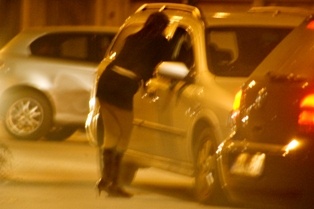Slavery is alive and well in Oregon, according to United States Attorney Dwight Holton. Last week, the Multnomah County Board of Commissioners called in a variety of law enforcement officers, prosecutors and victims' advocates to commemorate Human Trafficking Awareness Month.

"We need a modern day emancipation proclamation," Holton said.
But critics say the contradiction in how the law treats sex workers as criminals when they reach adulthood makes finding workable solutions difficult..
There are also few statistics to gauge how big or small the prostitution industry is in Portland.
In October 2009, the FBI conducted a nationwide sting involving 36 cities, 30 FBI divisions and 112 separate law enforcement agencies. They rescued about 50 underage girls who were working as prostitutes; four were rescued in Portland. A similar raid in February 2009 netted seven underage girls, a number that led national journalists – including Dan Rather – to label Portland as the "number 2" city for underage prostitution in the country.
During the October raid, 29 adult prostitutes were taken into custody. It's unclear how many were prosecuted, and how many were treated as "victims" and offered social services.
Apart from those raids, it's very difficult to get a gauge on how big the market is for child prostitutes in Portland or elsewhere. Portland Police Spokesperson Det. Mary Wheat told The Skanner News that statistics on prostitution arrests or sweeps in the city don't include age. Because there is only one charge for buying or selling sex, it's also nearly impossible to determine from pure statistics how many arrests are made of those buying the sex and those selling the sex.
The Skanner News is currently waiting for official numbers from the Portland Police Bureau.
The distinction of whether prostitutes are victims or criminals makes a difference to those calling attention to the abusive practice of sex trafficking. According to Vice Officer Meghan Burkeen, "We view young girls and women as victims."
But while individual officers and advocates may view adult prostitutes as victims, the law does not, allowing many of these women to be viewed as criminals, and tagging them with a criminal history that follows them for life.
Prosecutor J.R. Ujifusa told The Skanner News that he couldn't break down the number of women that are treated as victims and those that are prosecuted as criminals.
"There are individuals who are actively being pimped," he said. "Some swear they are not being pimped, and there are individuals who don't want to talk at all."
He said it is often difficult to prosecute pimps, because the girls themselves are "evidence." Many decline to testify, leave town or don't cooperate. He says if his office has any evidence that other people are coercing the women, they don't treat them as criminals.
The Skanner News is awaiting official statistics of the number of people prosecuted for prostitution from the Multnomah County District Attorney's Office.
For Jeri Williams, a longtime activist and survivor of sex trafficking, the criminalization of the seller is part of the problem.
"Either you're a victim or a criminal, you're not both," she said.
The problem for many women is fear – fear of retribution, fear of the unknown and fear of police. If a woman decides to testify against the man or men who are compelling her into prostitution, the authorities often lack the resources to properly protect her.
"I never busted mine (pimp)," she said. "Not only could he get to me, he had a bunch of people to get to me. You don't trust the cops either, they're not any better than the pimps."
In Sweden, it is illegal to purchase sex, but not to sell it. The country's 1999 law treats all prostitutes as victims, but criminalizes brothel keepers, pimps and johns. While some critics say the law has pushed prostitution further underground, proponents say it has reduced the number of prostitutes and made it easier for them to seek help.
In Portland, members of the Sex Workers Outreach Coalition told the city council in December 2009 that the most immediate need for women and girls was adequate housing, not further criminalization. Sen. Ron Wyden is sponsoring Senate Bill 2925 that will expand safe houses, treatment efforts and law enforcement funding through block grants. The grants will be available for only up to six locations in different regions across the country.
Chris Killmer of Catholic Charities says another pressing need involves immigrant women and girls. If many native born prostitutes are unable or afraid to go to police, the problem is compounded when girls are brought to this country without papers, he said.
"Many didn't know they had any rights in this country," he said.
To help solve the prostitution problem in Portland, the city has invested in a Prostitution Coordination Team, which is working on establishing a "John's School" to help try and reform those buying sex, as well as a Human Trafficking sergeant position at the Multnomah County Sheriff's Office.
Sgt. Jesse Luna, the deputy who has assumed that post, says they will be concentrating some efforts on monitoring and controlling the behavior of convicted pimps while they are behind bars.
"Even in jail, this behavior continues," he said.














































































































































































































































































































